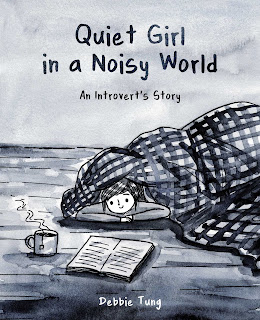In retrospect, Quiet Girl in a Noisy World prefigures Everything Is OK. This one ends with Tung taking a Myers-Briggs test, finding out she's INFJ, and having the usual happy "this explains everything about me" epiphany, which leads to her making positive changes in her life and, as she shows herself in this book, putting her on the path to happiness and success as a freelance artist.
OK, coming a few years later, I think depicts a slightly later moment, when Tung was diagnosed with depression - so, a more serious moment, at a time when her brain chemistry was actively harming her life on a level above "I have to deal with all of these extroverts all day long, and it's horrible." Reading them in the wrong order, as I did, does make Noisy Girl seem smaller and more tentative: I know Tung had larger, similar problems after this book, and the hopeful ending was not entirely justified by her subsequent life.
But this is still a positive book with a hopeful ending, drawn in an immediate style full of grey washes, that anatomizes a lot of things that other introverts will find true and helpful, along the way telling a big piece of Tung's own life story, as she transitions from academia to the working world (and incidentally gets married; that part of her life later grew into Happily Ever After).
I would bet this is still Tung's best-selling book, that it gets recommended randomly all the time and picks up new readers - especially young women like Tung, who are socialized to be friendly and outgoing and helpful and nice, but hate every damn last minute of that and need to hear that they can be themselves - and comes up in online algorithms and random social-media posts all the time. It's that kind of book: friendly, accessible, personal in a universal way. And I expect it will keep going along that way for a while - you may even yourself be the kind of introvert (young or not, female or not - I'm neither) that would find it fun and interesting and helpful.

No comments:
Post a Comment